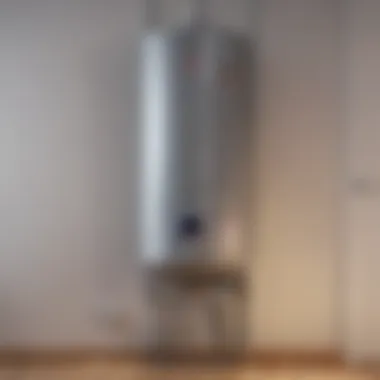Navigating Water Heater Coverage in Home Insurance


Intro
Home insurance serves as a crucial safety net for property owners, yet not all covered items enjoy the same level of protection. One area of particular interest is the coverage of water heaters, a significant appliance in many homes. Understanding the intricacies of this coverage is essential for homeowners who wish to protect their investment and ensure peace of mind.
Water heaters, though often overlooked, can present unique risks; they may leak, break down, or face damage due to external factors. As insurance policies can differ extensively, homeowners must grasp how their insurance addresses damages or losses associated with these appliances. This understanding empowers them to make informed choices about the required coverage and necessary steps they must take to safeguard against potential issues.
This article aims to tackle the various facets of water heater insurance coverage, from exploring typical scenarios in which coverage applies to discussing common exclusions. By shedding light on these key points, homeowners can better navigate their insurance policies and make sound decisions about their property's safety.
Coverage Options
To fully appreciate how water heater coverage fits into home insurance, it’s important to grasp the various coverage options available. Here, we will highlight the primary areas of coverage that homeowners should consider.
Types of Coverage Available
Water heater coverage generally falls under two main categories in most standard homeowners’ insurance policies: dwelling coverage and personal property coverage.
- Dwelling Coverage: This aspect of the policy typically includes protection for the actual structure of the home, which can encompass built-in appliances like water heaters. If a water heater sustains damage from a covered peril such as fire or explosion, dwelling coverage often provides compensation for repairs or replacement.
- Personal Property Coverage: If the water heater is not built into the home but instead is a separate unit, it may fall under personal property coverage. This type of coverage protects your belongings, including appliances, against loss or damage due to theft, fire, or other hazards. Homeowners should review their policy to confirm whether their water heater is included under personal property.
"Understanding the type of coverage you have is essential. It can save you significant costs and headaches during a claim."
Liability Coverage Explained
Another dimension of coverage includes liability protection. If a water heater leaks and causes damage in an adjacent property or injures someone, liability coverage in a homeowner's policy may come into play. This coverage helps with legal fees and compensation payments, protecting the homeowner from the financial burden associated with such incidents. It is advisable to review this aspect of the policy to ensure adequate protection.
Key Considerations
When evaluating water heater coverage under home insurance, there are several factors to keep in mind. Each consideration plays a role in how well protected the homeowners will be against possible risks associated with their water heaters.
Factors to Assess When Choosing Insurance
Homeowners should analyze various aspects of their insurance when considering coverage for their water heaters. Such aspects may include:
- Policy Exclusions: Understand the limitations and exclusions in your policy. Certain types of damage may not be covered, which could leave homeowners vulnerable.
- Deductibles: Knowing your deductible threshold is crucial. It dictates how much must come out of pocket before a claim can be filed.
- Replacement Costs vs. Actual Cash Value: Different policies might offer different levels of coverage, such as replacement costs or actual cash value. Homeowners should choose based on current and future needs.
Understanding Policy Limits
Another important element is the policy limits associated with water heater coverage. It is critical to ascertain whether the compensation available through your policy is sufficient to cover potential issues involving the water heater. Each policy has specific caps on claims, and understanding these limits helps homeowners avoid unexpected financial responsibilities.
In sum, it is crucial for homeowners to navigate the complexities associated with water heater coverage under home insurance. By gaining insight into the available options and key considerations, homeowners can achieve a more informed and secure approach to their property protection.
Overview of Home Insurance
Understanding home insurance is crucial for any homeowner. It acts as a safety net that protects one of the most significant investments in life—your home. Home insurance typically covers physical damage to the house itself and personal belongings inside it. This coverage is essential because it can safeguard against unexpected financial burdens arising from various disasters or accidents.
Definition and Purpose
Home insurance, also known as homeowners insurance, is designed to provide financial protection to homeowners against damages to their property or injuries potentially suffered by others on their premises. The primary purpose is not only to cover structural damage but also to cover liability for injuries that happen on your property. Each policy varies in terms of coverage limits, deductibles, and the specific risks covered. It is essential for homeowners to understand these variations to select the right policy that meets their needs.
Components of Home Insurance Policies
Home insurance policies generally consist of several key components:
- Dwelling Coverage: This covers the physical structure of the home against hazards such as fire, vandalism, and certain natural disasters.
- Personal Property Coverage: This protects belongings inside your home, such as furniture and electronics, in case of theft or damage.
- Liability Protection: This component covers legal expenses if someone is injured on your property and decides to sue.
- Additional Living Expenses: If your home becomes uninhabitable due to covered damage, this part helps with temporary housing costs.
Common Coverages Included


A comprehensive home insurance policy often includes various common coverages:
- Fire Damage: Coverage in case of loss due to fire.
- Windstorm Damage: Protection against damages from high winds or storms.
- Theft: Financial coverage for stolen items.
- Water Damage: Coverage for certain instances of water damage, though specifics can vary widely.
It is vital for homeowners to read and understand their policy thoroughly. Knowing what is covered can save time, stress, and monetary loss in the event of an accident or catastrophe.
What is a Water Heater?
Understanding what a water heater is forms a foundation for discerning how it fits into home insurance considerations. Water heaters are essential appliances in any home, providing hot water for various needs like cooking, cleaning, and bathing. This utility frequently goes unnoticed until a failure occurs. Knowing the different types and roles of water heaters can assist homeowners not only in selecting the right model for their needs but also in understanding the intricacies of their insurance coverage.
Types of Water Heaters
Water heaters come in several varieties, each with unique features and functions. Understanding these can help homeowners make informed decisions.
Tankless Water Heaters
Tankless water heaters, also known as on-demand heaters, heat water directly without the use of a storage tank. When hot water is needed, cold water travels through a pipe into the unit, where it is heated. This type is popular for its energy efficiency and endless supply of hot water.
The key characteristic of tankless water heaters is their compact size. Because they do not require a bulky tank, they save space, making them suitable for smaller homes or apartments. Their advantage lies in energy savings, as they only consume energy when hot water is needed. However, the initial installation cost can be higher than traditional heaters, which some homeowners may find burdensome.
Storage Water Heaters
Storage water heaters are the most common type found in households. They heat and store a specific amount of water in a tank until needed. This option is beneficial due to its simplicity and availability.
A notable feature of storage water heaters is their affordability. They typically have a lower upfront cost, making them an accessible choice for many homeowners. However, the downside is that they can run out of hot water if the demand exceeds the tank's capacity, leading to potential inconvenience.
Heat Pump Water Heaters
Heat pump water heaters operate differently compared to traditional electric water heaters. They utilize electricity to transfer heat from the surrounding air to the water in the tank. This method can significantly reduce energy consumption.
Their distinguishing advantage is efficiency. Heat pump water heaters can be two to three times more energy-efficient than conventional models. However, they are more complex and usually come at a higher initial cost. Homeowners in colder climates might find them less effective during low temperatures, limiting their appeal.
Role in Household
Water heaters serve a fundamental role in daily life. They provide hot water for baths, showers, laundry, and dishwashing. This appliance is often deemed essential for comfort and functionality in any household. Without it, many tasks would be challenging. Hence, understanding its function can aid in evaluating risks associated with its potential failure.
"Water heaters are often taken for granted until they break down, highlighting the need for appropriate insurance coverage to safeguard homeowners from unexpected costs."
Additionally, homeowners should be proactive in keeping their water heaters maintained. Regular checks can prevent costly emergencies. In the context of home insurance, knowing the type of water heater can influence policy details. It can help in understanding what scenarios are likely to be covered and what preventive measures can be taken to avoid claims.
Insurance Coverage for Water Heaters
Understanding the insurance coverage for water heaters is vital for homeowners. Water heaters play a crucial role in modern households, providing hot water for various uses such as bathing, cleaning, and heating. Given their importance, any malfunction or damage can impact daily life significantly. Therefore, it is essential to know how home insurance covers such appliances, what scenarios apply, and what exclusions might be present. A clear understanding aids homeowners in making informed decisions about their policies and ensuring their investments are adequately protected.
General Coverage Considerations
When evaluating coverage for water heaters under home insurance, several factors must be taken into account. First, policies vary widely in terms of coverage options. Many standard homeowner policies provide some level of coverage for water heaters, typically under personal property protection. However, limitations often exist depending on the cause of damage. Homeowners should ensure they comprehend the specific terms outlined in their policies.
Another consideration is the deductible. Home insurers often have a deductible amount that policyholders must pay before their coverage kicks in. It is also beneficial to review supplementary coverage options that might address specific concerns regarding water heater failures. Regular policy reviews can help homeowners maintain optimal coverage.
Common Scenarios of Coverage
Water Damage from a Burst Heater
Water damage from a burst heater is a critical aspect of coverage under home insurance. This scenario often occurs when a water heater experiences a malfunction due to age or manufacturing defects. The resultant water leakage can lead to significant damage to property, prompting insurers to address such incidents.
The key characteristic of water damage from a burst heater is the potential for extensive loss. This kind of damage is common, making it a relevant point in this article. Insurance policies that cover this scenario typically include the costs of repairing damaged floors, walls, and any affected personal property. However, it is important to check the limits of coverage, as some policies might not cover everything.
Loss Due to Fire
Loss due to fire is another significant concern related to water heaters. If a water heater malfunctions and causes a fire, the damages can be devastating. Home insurance usually covers structural damage as well as damage to personal belongings resulting from such incidents.
The importance of this coverage cannot be overstated. Fires can escalate quickly and spread, resulting in total loss. Having insurance that specifically addresses fire damage due to heater malfunction provides peace of mind. However, total coverage may depend on the origin of the fire. Policies might differ on coverage for negligence versus malfunction, emphasizing the need for clarity in terms and situations.


Accidental Damage
Accidental damage represents a broader category within water heater coverage. This includes unexpected incidents that cause harm to the appliance itself or surrounding property. Whether from a dropped item, improper installation, or another unforeseen accident, homeowners may need to rely on their insurance for repairs or replacements.
The unique feature of accidental damage is that it typically requires proof that the incident was indeed accidental as opposed to a maintenance issue. This can complicate claims. Therefore, understanding the specifics of a policy regarding accidental damage can help homeowners mitigate risks associated with such situations.
Remember, always document any incidents regarding your water heater. This documentation can support future claims and ensure better outcomes with home insurance providers.
Exclusions in Home Insurance Policies
Understanding exclusions in home insurance policies is crucial for homeowners who want to protect their investments. While most policies cover a wide range of damages, they also include specific exclusions that can leave homeowners vulnerable. Knowing these limitations can guide residents in managing their risks effectively.
Exclusions specify what is not covered by the insurance policy. This section will explain the various types of exclusions, particularly concerning water heaters, and their significance. Homeowners should recognize that understanding exclusions helps them assess their needs and take precautionary measures.
Wear and Tear
Wear and tear refers to gradual deterioration of an appliance over time. For water heaters, this might manifest as reduced efficiency, leaks, or rust. Most home insurance policies categorize wear and tear under exclusions. This means that if a water heater fails because it is old or has been used extensively, the homeowner may not receive any compensation.
Homeowners should regularly inspect the water heater for signs of age and damage. Putting off maintenance can lead to greater expenses later, especially if the issue is neglected until it results in significant damage or leakage.
Some common signs of wear and tear include:
- Corrosion on the tank or fittings
- Inconsistent water temperature
- Unusual noises from the heater
- Water pooling around the base
Neglect and Maintenance Issues
Neglect involves failing to maintain a water heater properly. Homeowners are expected to conduct regular inspections and maintenance to ensure the device operates correctly. If damage occurs due to neglect, insurance companies are likely to deny claims based on this exclusion.
Inspecting the water heater includes checking the following:
- Temperature settings to prevent overheating
- Pressure relief valve for proper functioning
- Anode rod replacement to combat corrosion
Failure to address basic maintenance could lead to severe leaks or even complete appliance failure. Homeowners should consider establishing a routine maintenance schedule for their water heaters. Neglecting these responsibilities not only compromises safety but also puts financial coverage at risk.
Assessing Your Home Insurance Policy
Assessing your home insurance policy is crucial for understanding how well your coverage aligns with your needs, especially regarding your water heater. As a homeowner, knowing the specifics of your policy can prevent unexpected financial burdens. A clear grasp of coverage details helps you identify which scenarios are protected and aids in making informed decisions on potential upgrades or additional coverage.
Reviewing Coverage Details
When reviewing your home insurance policy, focus on the specific details regarding water heater coverage. Each policy can differ significantly in terms of coverage limits and the type of damage that is included. Look for clauses related to:
- Specific Damage Scenarios: Policies may detail what types of damage, like flooding or severe thermal expansion, are covered.
- Replacement Conditions: Understand if the policy covers full replacement or only partial costs depending on the age and condition of the heater at the time of damage.
- Maintenance Requirements: Home insurance typically stipulates certain maintenance checks and records that must be kept to maintain coverage.
It's prudent to note any terms that may limit coverage, such as exclusions for certain types of damage not related to accidents or natural disasters. These details are critical, as they shape your understanding of potential risks and how to mitigate them effectively.
Understanding Deductibles
Deductibles play a significant role in your claims process. A deductible is the amount you are responsible for paying before your insurance coverage kicks in. Understanding your deductible is essential:
- Impact on Claims: A higher deductible generally means a lower premium but may make it less feasible to file a claim for damage that occurs to your water heater.
- Evaluating Financial Risk: Consider your financial capability to cover deductibles against the cost of potential repairs or replacements of your water heater.
- Flexibility in Planning: Review your deductible options when renewing your policy. Choosing a deductible that aligns with your financial comfort level can facilitate better cash flow during unexpected repairs.
In summary, assessing both coverage details and deductibles regarding your home insurance policy will empower you as a homeowner. This understanding allows you to protect your water heater better and ensures you have appropriate responses in place if something goes wrong.
Steps to Take if a Water Heater Fails
In the unfortunate event that a water heater experiences a failure, it is crucial for homeowners to act swiftly and efficiently. Understanding the steps to take can minimize damage, streamline the claims process, and ensure that you receive the necessary support from your insurance policy. Knowing what to do when a water heater fails is a fundamental aspect of maintaining your home and protecting your investment.


Documenting the Damage
One of the first and most important actions to take after discovering a water heater failure is to document the damage. This involves taking clear photographs and videos of the affected areas, including any visible leaks, water damage, or physical damage to the heater itself. Keep track of the time and date of the incident, as well as any conversations with household members about the issue.
It’s also wise to note the extent of the damage. For example, assess whether water has affected walls, floors, or nearby appliances. This information can prove valuable when working with your insurance agent. Detailed documentation can help in substantiating your claim and ensuring that you receive appropriate compensation.
Contacting Your Insurance Agent
After documenting the damage, the next step is to contact your insurance agent. This action cannot be emphasized enough, as your insurance agent will provide guidance tailored to your specific policy. Reach out to them as soon as possible.
When you contact your insurance agent, be prepared to share the details you have documented. Describe the situation, including how the failure occurred, the extent of the damage, and any immediate actions you have taken, such as shutting off the water supply or arranging for emergency repairs.
During this conversation, ask about the next steps in the claims process and what information or documentation they will need from you. Understanding your policy's coverage related to water heater failures will help determine the support you will receive. It is also helpful to check the timelines for reporting claims, as most insurance companies have specific timeframes for claims submission.
It’s important to remember that timely communication with your insurance agent is essential to a successful claims experience.
Taking these steps after a water heater failure empowers homeowners with the knowledge to navigate the claims process effectively. Preparing for potential issues and acting quickly can greatly reduce stress and financial strain associated with home repairs.
Preventative Measures for Homeowners
The significance of preventative measures for homeowners cannot be overstated, especially when it comes to protecting essential appliances like water heaters. Given the potential costs associated with water heater failures, taking the right steps can save homeowners not only money but also time. These preventative actions focus on maintaining the efficiency and longevity of water heaters, preventing leaks, and minimizing damage to the home.
When homeowners proactively care for their water heaters, they improve the appliance's lifespan and reduce the risk of catastrophic failures. This approach aligns well with home insurance policies, which vary in coverage for damages that arise from maintenance neglect.
By investing time in regular check-ups and maintenance, homeowners can often avoid complicated insurance claims that are denied due to lack of care. Identifying issues early, such as unusual noises or signs of rust, can lead to timely interventions that prevent further deterioration.
Another important aspect of preventative measures is understanding how to enhance water heater safety. This understanding not only benefits the homeowner but also the overall value of the property.
Regular Maintenance Tips
Maintenance of a water heater is crucial to ensure its efficiency and effectiveness. Here are some key tips:
- Flushing the Tank: Sediment builds up in the tank over time. It is advisable to flush the tank annually to remove this sediment.
- Inspect the Anode Rod: Regularly check this rod, which protects the tank from rust. Replace it if it’s less than ½ inch thick or covered in corrosion.
- Check Pressure Relief Valve: Periodically test the pressure relief valve to ensure it is functioning correctly. This valve helps prevent pressure build-up that could lead to leaks or explosions.
- Monitor Temperature Settings: Keep the thermostat set to 120 degrees Fahrenheit to reduce overheating and increase energy efficiency.
Performing these maintenance tasks can help homeowners prevent leaks and associated water damage, ultimately resulting in fewer insurance claims.
Installing a Leak Detection System
A leak detection system is a proactive approach to safeguarding against unexpected water damage. Such systems provide early alerts, allowing homeowners to react before substantial damage occurs.
Here are some benefits of installing a leak detection system:
- Real-Time Monitoring: Many modern systems can send alerts to smartphones or home management systems, providing instant notifications of leaks.
- Automatic Shut-off: Some advanced systems automatically shut off the water supply when a leak is detected, significantly reducing potential damage.
- Ease of Installation: These systems can often be installed without professional assistance, making them accessible for many homeowners.
Incorporating a leak detection system into your home can be a valuable investment. It helps in maintaining not just the water heater, but also the entire home’s structure, reducing risks associated with water damage.
By implementing these preventative measures, homeowners can ensure their water heaters operate effectively while minimizing the risk of costly damages.
Closure
In this article, we have examined the nuances surrounding water heater coverage under home insurance policies. The significance of understanding this topic cannot be understated, especially for homeowners who rely on these systems for daily comfort and functionality. A faulty water heater can lead to substantial financial loss and significant inconvenience, making it key to have a clear grasp of what your home insurance policy covers.
A thorough comprehension of the coverage helps homeowners make informed decisions regarding their policies. Key considerations include how to interpret your policy statements, identifying common exclusions, and knowing the procedures to take when facing a water heater malfunction.
Understanding water heater coverage also involves recognizing the importance of maintenance and preventative measures. By regularly caring for the water heater, homeowners can mitigate risks and potentially reduce insurance claims related to water damage.
"Knowledge is power; it equips homeowners to protect their investment and enhance their living conditions."
Key Takeaways
- Policy Review is Essential: Always review your home insurance policy in detail. Understand specific terms relating to water heater coverage.
- Exclusions Matter: Be aware of common exclusions like wear and tear or negligence. Knowing these can prevent unpleasant surprises during a claim process.
- Document and Communicate: If a water heater fails, document the damage comprehensively. Contact your insurance agent promptly for guidance.
- Preventative Maintenance: Implement regular maintenance practices. These can extend the lifespan of the heater and help avoid costly damages.
- Flood Risk Assessment: Consider installing a leak detection system to reduce risks associated with unexpected failures.
By synthesizing the details discussed throughout this article, homeowners can navigate the complexities of insurance coverage for water heaters effectively, ensuring both peace of mind and financial protection.



